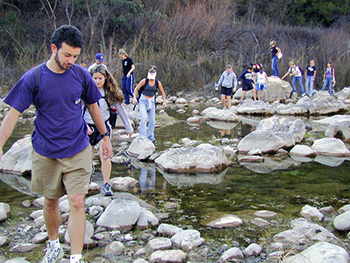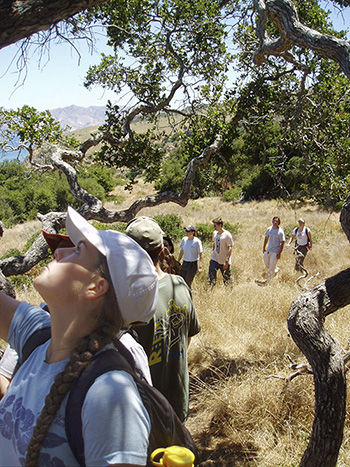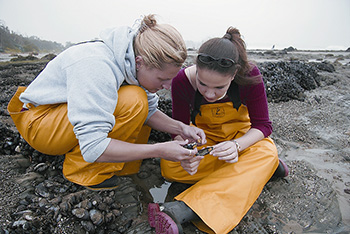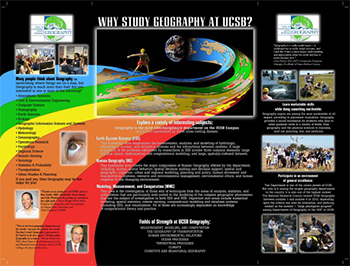Research Areas

UCSB Geography is internationally recognized as one of the best Departments of Geography in the world, and we have been ranked among the top doctoral programs in the U.S. by a variety of indices for the last 15 years. Geography’s highly trained and diverse faculty bring together aspects of International Development Studies, Urban and Regional Planning, Climatology, Terrestrial Sciences, Marine Sciences, Statistics and Operations Research, and Environmental Psychology. Active research areas include: global climate change; development studies; geographical analysis, GIS, and remote sensing; global climate change; natural hazards and risk; regional geography; spatial optimization, spatial perception and cognition; sustainability, resources, and conservation; transportation and planning; and urban studies. If this broad perspective appeals to you, then you’re a candidate for a Bachelor of Arts or a Bachelor of Science in GEOGRAPHY!

Geography Is the Most Interdisciplinary Department on the UCSB Campus It is also the most integrated discipline on campus, insofar as the material taught in our classes about environmental processes can be found in other disciplines, but are only put together as a whole story in Geography. Above all, Geography is “spatial”—virtually everything has a spatial component, from the distribution of subatomic particles to the choices we make when we buy groceries. Therefore, as a Geographer, you can choose to study an enormous range of subjects. Geography is also an extremely hands-on discipline with a strong emphasis on using computer–based tools and participating in field studies. Knowing where things are, why they got there, and how they work is critical to understanding our world today and how it is changing—this is Geography!
The UCSB Department of Geography Is Represented By Three Cross-Cutting Themes
- Physical Geography: the physical and biological processes of the environment
- Human Geography: the way humans perceive, interact with, and modify the environment
- Modeling, Measurement, and Computation: techniques for the collection, analysis, and interpretation of geospatial data using tools such as GIS, remote sensing, and spatial statistics
We are internationally recognized as one of the largest and highest ranked Departments of Geography, and our faculty routinely win the most prestigious awards in their fields (see Awards and Rankings). Some of our most popular classes include Geography of Surfing, Geography of the U.S., Remote Sensing, Geography of the Channel Islands, and GIS. For a more complete list of our classes and the faculty who teach them, see the General Catalog.
Becoming a Geography Major

To declare Geography as a major, students need to have completed two Geography classes and have a 2.0 overall grade point average.
Undergraduate Degrees Offered in Geography:
-
-
- The Department of Geography at UCSB offers four undergraduate majors. The Bachelor of Arts in Geography is a broad and integrative degree that spans departmental strengths in human and physical geography as well as geographic information science. The Bachelor of Arts in Geography with an emphasis in GISci is a more focused degree requiring extensive coursework across select concentration areas: (1) Air Photos and Remote Sensing, (2) Geographic Information Systems and Cartography, and (3) Quantitative Techniques and Theoretical Methods. The Bachelor of Science in Physical Geography is a broad and integrative degree within the earth/environmental sciences that incorporates terrestrial, marine, and atmospheric sciences. It provides the more extensive mathematical and biophysical-science training normally associated with a BS degree. The Bachelor of Science with an emphasis in Ocean Science is a more focused degree requiring coursework focused on oceanography and marine systems as well as climate and earth system science.
-
- Courses Outside of Geography which Count as Credit Towards the Major:
A maximum of eight upper division units from related fields may be included for Geography credit for a BA, automatically applied toward the major without petition from a list of approved courses (see Related Courses). - How to Declare a Major in Geography:
Make an appointment with your Undergraduate Advisor on the Undergraduate Advising page
What Other Majors Combine Well with Geography for a Double Major?

Environmental Studies is the number one candidate; other majors that are compatible with Geography include Computer Science, Earth Science, Statistical Science, Business Economics, Biological Sciences, Linguistics, and many more. Students with interest and talent in two separate major fields may propose completion of a double major. In their proposal, they must estimate the number of units they will need to complete in satisfying degree requirements and the term in which they will become eligible to graduate. In general, double majors are approved for students who demonstrate that they can meet all degree requirements without exceeding 200 units of credit from all institutions attended. Students who receive approval for a double major will be allowed to continue their studies at UCSB only through the final quarter listed on their proposal. No more than 8 units may be applied simultaneously to the upper-division requirements of the two majors. See http://www.duels.ucsb.edu/advising/petitions#double-major.

What Sort of a Job Can I Get with a Degree in Geography?
-
- Geography majors are among the most marketable of all majors, according to placement counselors. As the
Association of American Geographers Career Guide
- points out, Geography’s theories and methods provide analytical techniques applicable to a wide range of topics covered over a broad spectrum of occupations.
- For students planning to end their formal education with the bachelor’s degree, a major in Geography provides marketable skills and the broad perspectives on environment and society that enable graduates to move beyond entry-level positions. Geography also provides a sound foundation for students who plan to enter graduate work in a variety of fields, from geography and the physical and social sciences to business, land use planning, law, and medicine.
- Geography majors find work as public sector transportation planners; environmental impact analysts; airline route specialists; import / export and shipping logistics planners; geodemographic analysts and marketers; strategic planners in banking, insurance, and real estate; software developers; web designers and programmers; urban and regional planners; computer cartographers using Geographic Information Systems; international trade consultants; teachers at all levels; studies of satellite imagery/remote sensing, climate change analysis, and land use/ land cover change; and much, much more.
- Visit the Careers in Geography page. Also, the following links provide fascinating commentaries on people with geographic training who make use of their knowledge in careers one might not expect to find them in: Hidden Geographers and Geography Jobs.
